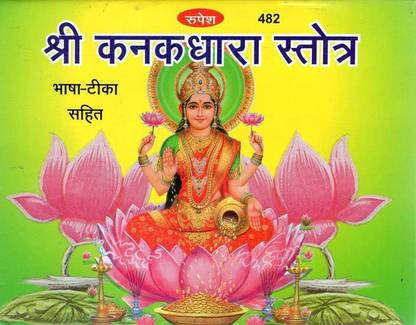Kanakadhara Stotram (Sanskrit: कनकधारा स्तोत्रम्, kanakadhārā stotram) is a hymn (Stotra) composed in Sanskrit by Adi Sankara. kanakadhārā means "stream" (dhārā) of "gold" (kanaka), and the hymn is called by this name since legend has it that when Adi Sankara recited it, Goddess Lakshmi appeared in front of him and unleashed a stream of gold.
Origin
The hymn was written in the 8th century CE by Adi Sankara, a revered Hindu philosopher, theologian and Jagad Guru(Master to the world). Sankara took Sanyasa (renunciation) at the age of eight.
One day, as a young boy, he was on bhiksha for alms to prepare his lunch and happened upon the doorstep of a very poor Brahmin lady. Having nothing edible in her home, the lady frantically searched her house, only to find a single amla (Amalak, gooseberry) fruit which she then hesitantly offered to Sankara. Sankara was so moved by the incredible kindness and selflessness of this woman that he burst forth into poetry and sang 22 stanzas in praise of Goddess Lakshmi. Pleased by the beauty and power of the hymn, the Goddess appeared before him and asked him why he had remembered her. Sankara pleaded with the Goddess to reverse the fortunes of this lady's family by granting her riches. At first, Goddess Lakshmi refused to do so, saying that the lady had not been charitable in her previous birth and was bound by the laws of karma to have a fate bound to poverty in her current birth. Sankara implored the Goddess that the lady's act of absolute selflessness should absolve her of her sins of the past and that Lakshmi was the only one capable of changing the fate of someone by erasing or changing the writings of the future made by Lord Brahma. Goddess Lakshmi was so pleased that she instantly showered the lady's house with goose berries made of pure gold.
The stanza that contains the purport of Sankara's imploration to Goddess Lakshmi is among the most important ones in this hymn:
दद्याद् दयानुपवनो द्रविणाम्बुधाराम्
अस्मिन्नकिञ्चनविहङ्गशिशौ विषण्णे ।
दुष्कर्मघर्ममपनीय चिराय दूरं
नारायणप्रणयिनीनयनाम्बुवाहः ॥
May She (Goddess Lakshmi) bestow (upon us) a stream of wealth through the wind of her mercy,
For I, utterly destitute and downcast by poverty, am as helpless as the newborn child of a bird,
May She (Goddess Lakshmi) remove forever the heat I suffer due to the sins of my past,
O, beloved of Narayana, may your eyes rain upon me (the shower of your mercy.)
The 21 stanzas of kanakadhārā stotram then became famous and are read by all devout Hindus for wellbeing.
Description
The hymn contains a description of the beauty, personality, power and graciousness of Goddess Lakshmi. Sankara does not distinguish between the three Goddesses of Hinduism. For him Lakshmi, Parvati and Saraswati are the same.
ज्योतिष में धन प्राप्ति के अनेकों उपाय बताए गए है पर उनमें जो सबसे अधिक प्रभावशाली व शीघ्र फलदायी है, वो है कनकधारा स्त्रोत का विधि – विधान से नियमित पाठ। इसकी रचनाकार आदि शंकराचार्य है जिन्होंने इसकी सहायता से सोने की बारिश करवाई थी। एक बार आदिशंकराचार्य भिक्षा मांगने किसी गरीब ब्राह्मण के घर गए। उसके पास उन्हें देने के लिए कुछ नहीं था। उसने भिक्षा के रूप में उन्हें एक सूखा आंवला दे दिया। उसकी दरिद्रता दूर करने के लिए उन्होंने मां लक्ष्मी से प्रार्थना की। प्रार्थना पूरी होते ही उसके घर सोने के आंवलों की वर्षा होने लगी। उनकी ये प्रार्थना कनकधारा स्रोत के नाम से प्रसिद्ध है।
॥ कनकधारा स्तोत्रम् ॥
 Buy this Book
Buy this Book
अङ्गं हरेः पुलकभूषणमाश्रयन्तीभृङ्गाङ्गनेव मुकुलाभरणं तमालम्।
अङ्गीकृताऽखिल-विभूतिरपाङ्गलीलामाङ्गल्यदाऽस्तु मम मङ्गळदेवतायाः॥१॥
मुग्धा मुहुर्विदधती वदने मुरारेःप्रेमत्रपा-प्रणहितानि गताऽऽगतानि।
मालादृशोर्मधुकरीव महोत्पले यासा मे श्रियं दिशतु सागरसम्भवायाः॥२॥
विश्वामरेन्द्रपद-वीभ्रमदानदक्षआनन्द-हेतुरधिकं मुरविद्विषोऽपि।
ईषन्निषीदतु मयि क्षणमीक्षणर्द्धमिन्दीवरोदर-सहोदरमिन्दिरायाः॥३॥
आमीलिताक्षमधिगम्य मुदा मुकुन्दआनन्दकन्दमनिमेषमनङ्गतन्त्रम्।
आकेकरस्थित-कनीनिकपक्ष्मनेत्रंभूत्यै भवेन्मम भुजङ्गशयाङ्गनायाः॥४॥
बाह्वन्तरे मधुजितः श्रित कौस्तुभे याहारावलीव हरिनीलमयी विभाति।
कामप्रदा भगवतोऽपि कटाक्षमाला,कल्याणमावहतु मे कमलालयायाः॥५॥
कालाम्बुदाळि-ललितोरसि कैटभारे-धाराधरे स्फुरति या तडिदङ्गनेव।
मातुः समस्तजगतां महनीयमूर्ति-भद्राणि मे दिशतु भार्गवनन्दनायाः॥६॥
प्राप्तं पदं प्रथमतः किल यत् प्रभावान्माङ्गल्यभाजि मधुमाथिनि मन्मथेन।
मय्यापतेत्तदिह मन्थर-मीक्षणार्धंमन्दाऽलसञ्च मकरालय-कन्यकायाः॥७॥
दद्याद् दयानुपवनो द्रविणाम्बुधारामस्मिन्नकिञ्चन विहङ्गशिशौ विषण्णे।
दुष्कर्म-घर्ममपनीय चिराय दूरंनारायण-प्रणयिनी नयनाम्बुवाहः॥८॥
इष्टाविशिष्टमतयोऽपि यया दयार्द्र दृष्ट्यात्रिविष्टपपदं सुलभं लभन्ते।
दृष्टिः प्रहृष्ट-कमलोदर-दीप्तिरिष्टांपुष्टिं कृषीष्ट मम पुष्करविष्टरायाः॥९॥
गीर्देवतेति गरुडध्वजभामिनीतिशाकम्भरीति शशिशेखर-वल्लभेति।
सृष्टि-स्थिति-प्रलय-केलिषु संस्थितायैतस्यै नमस्त्रिभुवनैकगुरोस्तरुण्यै॥१०॥
श्रुत्यै नमोऽस्तु नमस्त्रिभुवनैक-फलप्रसूत्यैरत्यै नमोऽस्तु रमणीय गुणाश्रयायै।
शक्त्यै नमोऽस्तु शतपत्र निकेतनायैपुष्ट्यै नमोऽस्तु पुरुषोत्तम-वल्लभायै॥११॥
नमोऽस्तु नालीक-निभाननायैनमोऽस्तु दुग्धोदधि-जन्मभूत्यै।
नमोऽस्तु सोमामृत-सोदरायैनमोऽस्तु नारायण-वल्लभायै॥१२॥
नमोऽस्तु हेमाम्बुजपीठिकायैनमोऽस्तु भूमण्डलनायिकायै।
नमोऽस्तु देवादिदयापरायैनमोऽस्तु शार्ङ्गायुधवल्लभायै॥१३॥
नमोऽस्तु देव्यै भृगुनन्दनायैनमोऽस्तु विष्णोरुरसि स्थितायै।
नमोऽस्तु लक्ष्म्यै कमलालयायैनमोऽस्तु दामोदरवल्लभायै॥१४॥
नमोऽस्तु कान्त्यै कमलेक्षणायैनमोऽस्तु भूत्यै भुवनप्रसूत्यै।
नमोऽस्तु देवादिभिरर्चितायैनमोऽस्तु नन्दात्मजवल्लभायै॥१५॥
सम्पत्कराणि सकलेन्द्रिय-नन्दनानिसाम्राज्यदान विभवानि सरोरुहाक्षि।
त्वद्-वन्दनानि दुरिताहरणोद्यतानिमामेव मातरनिशं कलयन्तु नान्यत्॥१६॥
यत्कटाक्ष-समुपासनाविधिःसेवकस्य सकलार्थसम्पदः।
सन्तनोति वचनाऽङ्गमानसैःस्त्वां मुरारि-हृदयेश्वरीं भजे॥१७॥
सरसिज-निलये सरोजहस्तेधवळतरांशुक-गन्ध-माल्यशोभे।
भगवति हरिवल्लभे मनोज्ञेत्रिभुवन-भूतिकरि प्रसीद मह्यम्॥१८॥
दिग्घस्तिभिः कनककुम्भमुखावसृष्टस्वर्वाहिनीविमलचारु-जलप्लुताङ्गीम्।
प्रातर्नमामि जगतां जननीमशेषलोकाधिराजगृहिणीम मृताब्धिपुत्रीम्॥१९॥
कमले कमलाक्षवल्लभेत्वं करुणापूर-तरङ्गितैरपाङ्गैः।
अवलोकय मामकिञ्चनानांप्रथमं पात्रमकृत्रिमं दयायाः॥२०॥
स्तुवन्ति ये स्तुतिभिरमीभिरन्वहंत्रयीमयीं त्रिभुवनमातरं रमाम्।
गुणाधिका गुरुतरभाग्यभागिनोभवन्ति ते भुविबुधभाविताशयाः॥२१॥
॥ श्रीमदाध्यशङ्कराचार्यविरचितं श्री कनकधारा स्तोत्रम् समाप्तम् ॥

.jpg)



0 Comments